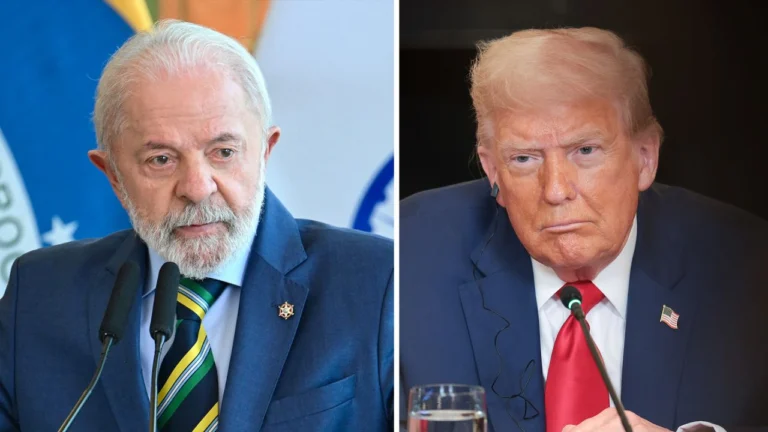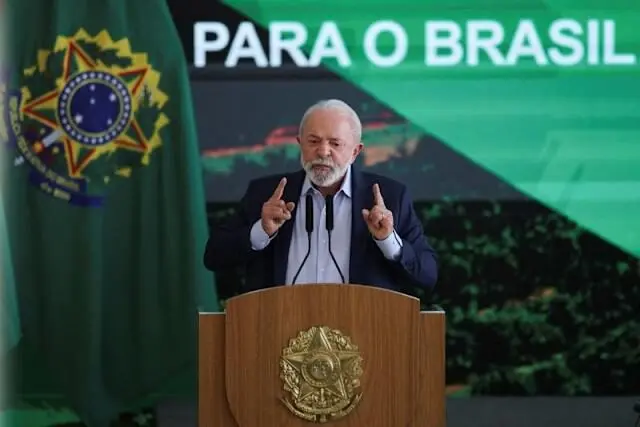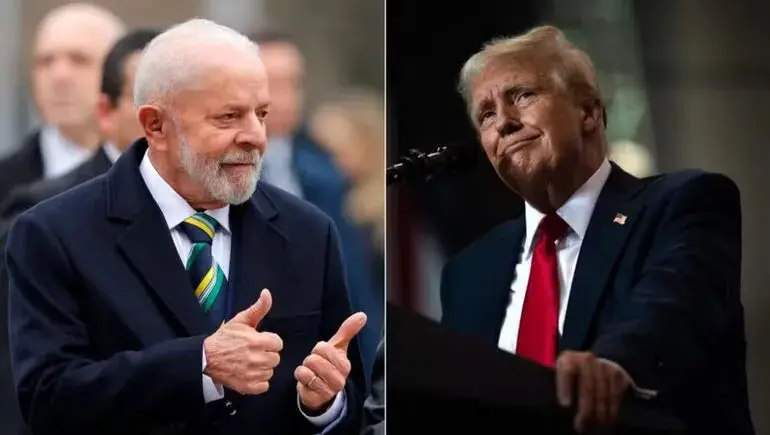Brazil-US tariff dispute: 50% Tariff Threat Sparks Brazil’s Bold Fight Back in Growing Trade Dispute

Presidents Lula of Brazil and Joe Biden of the U.S. in statements about the trade dispute between the two countries. 13/72025
July 13, 2025 Hour: 8:15 am
Brazil responds to Trump’s 50% tariffs with legal action and economic retaliation. The Brazil-US tariff dispute escalates amid political tension and global economic concerns.
Geopolitical Context Behind the Brazil-US Tariff Dispute
The Brazil-US tariff dispute has taken center stage in international trade discussions after U.S. President Donald Trump announced a 50% tariff hike on Brazilian imports, effective August 1, 2025. The move, communicated via social media and an official letter to Brazilian President Luiz Inácio Lula da Silva, was framed by Trump as a response to what he described as “unfair judicial treatment” of former Brazilian leader Jair Bolsonaro and “attacks on free speech” in Brazil.
Lula immediately rejected the accusation, calling it a “blatant overreach into Brazil’s sovereignty”, and vowed to fight the decision using all available tools — including economic, legal, and diplomatic channels. The dispute comes at a time when Brazil is deepening its integration with emerging economies through the BRICS bloc, positioning itself as a key player in a multipolar world order.
🔗 World Bank – Global Trade Policy Reports
Lula Responds: “Brazil Will Fight in All Fronts”
In a firm statement from Brasilia, President Lula said: “Brasil é um país soberano que não será tutelado por ninguém.” (“Brazil is a sovereign country that will not be dictated to by anyone.”) He emphasized that the judicial process against former President Jair Bolsonaro is entirely within the jurisdiction of Brazilian courts and warned that any attempt to interfere would be met with strong resistance.
“This is not just about commerce,” Lula continued. “It’s about respect for our institutions, our laws, and our people.”

He also refuted Trump’s claims of a bilateral trade imbalance, citing data from the Brazilian-American Chamber of Commerce, which shows the U.S. has maintained a $43 billion trade surplus with Brazil over the past decade.
🔗 Brazilian-American Chamber of Commerce – Trade Data
Economic Reciprocity Law: A Legal Weapon Against Unilateral Tariffs
In response to the threat, Lula announced the activation of Brazil’s Economic Reciprocity Law, approved by Congress in April 2025. This law allows the government to impose proportional countermeasures against unilateral trade actions that harm Brazilian interests.
“If they charge us 50%, we’ll charge them 50%,” Lula declared during a televised address, sending a clear message that Brazil will not back down without a fight.
The legislative leadership in both houses of Congress — Senate President Davi Alcolumbre and House Speaker Hugo Motta — fully supported the move, stating that Brazil has the means to protect its sovereignty and economy while maintaining balance and proportionality in its response.
🔗 Brazilian Government – Economic Reciprocity Law
Risk of a Full-Scale Trade War
Experts warn that the Brazil-US tariff dispute could spiral into a full-scale trade war, with unpredictable consequences for both economies and global markets. The proposed 50% tariff is the highest ever imposed by the U.S. on a major trading partner in recent months, surpassing those applied to Japan, South Korea, and South Africa.
Trump has tied the removal of the tariffs to conditions that Lula calls unacceptable — namely, halting the legal proceedings against Bolsonaro and opening up Brazil’s market further to U.S. goods. These demands are widely seen as an attempt to use economic leverage for political influence, raising alarms among diplomats and trade analysts.
Some sources within the Brazilian presidency believe the move is being orchestrated by domestic far-right groups aligned with Bolsonaro, who seek to destabilize Lula’s administration through external pressure.
Immediate Economic Fallout and Business Response
Markets reacted swiftly to the news, with shares of major Brazilian exporters plummeting. Embraer, the state-owned aerospace company, saw its stock fall by nearly 9%, while major banks lost more than 2%. Key export sectors — including agriculture, automotive manufacturing, and heavy machinery — fear significant disruptions in their access to the U.S. market, Brazil’s second-largest trade partner after China.
In response, Lula has announced the formation of a Crisis Trade Committee, composed of government officials and business leaders, to monitor developments and adjust Brazil’s commercial strategy accordingly.
Diplomacy Over Coercion: Brazil’s Openness to Dialogue
Despite the tough rhetoric, the Brazilian government has reiterated its willingness to engage in dialogue with the U.S. to resolve the issue peacefully. Finance Minister Fernando Haddad stressed that Brazil remains open to negotiation but will not accept political interference or threats to its judicial independence.
“We want to find a solution through diplomacy,” Haddad said, “but we won’t allow our democracy to be held hostage by foreign interests.”
Institutional Relations Minister Gleisi Hoffmann called the 50% tariff “the greatest attack on Brazil in peacetime” and urged the international community to reject the weaponization of trade policy for political ends.

Implications for BRICS and Global Trade Order
The Brazil-US tariff dispute occurs at a pivotal moment in global geopolitics. As Brazil plays a leading role in the BRICS alliance — alongside China, Russia, India, and South Africa — the confrontation highlights growing tensions between Western-dominated trade systems and emerging economies seeking greater autonomy.
Lula has been vocal in his support for a multipolar world, rejecting the idea of a single superpower dictating terms to others. “The world has changed,” he said recently. “We are sovereign nations. We don’t want emperors.”
Trump’s threat to extend similar tariffs to other BRICS countries has only reinforced this perception, fueling fears of a broader shift toward protectionism and politicized trade practices.
Conclusion: Sovereignty vs. Pressure in a Multipolar Era
President Lula’s response to the Brazil-US tariff dispute marks a defining moment in Brazil’s foreign policy and trade strategy. By standing firm against external pressure and activating legal and economic tools, Lula is signaling that Brazil will defend its sovereignty and democratic institutions unapologetically.
As tensions rise, the world watches closely to see whether this dispute will escalate into a wider trade conflict — or become a turning point in how emerging economies respond to economic coercion.
Author: JMVR
Source: VTV






